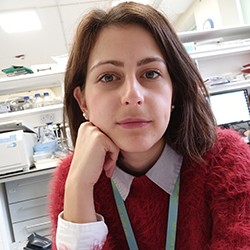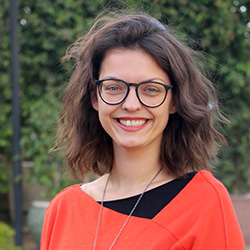Thursday 10 December, 1pm - 2pm
Unravelling the signals that drive the differentiation of the endometrial epithelium
Konstantina Nikolakopoulou (Pathology)
Data Flows: Monetising Periods
Stefanie Felsberger (Gender Studies)
Chair: Jarrah O'Neill (Reproductive Sociology Research Group)
The Early Researchers Seminar Series (ERSS) is a platform for PhD Students and early career researchers (ECRs) at the University of Cambridge with research foci on reproduction to share and discuss their research with other academics from a range of disciplines also researching reproduction at the University. Seminars are held on Zoom on the second Thursday of every month, 1pm - 2pm. For more information, and for the full 2020 - 2021 programme, please see the main ERSS page.
Speakers and abstracts
Unravelling the signals that drive the differentiation of the endometrial epithelium
Konstantina Nikolakopoulou (Pathology)
The human endometrium, the mucosal lining of the uterus, is a dynamic tissue which undergoes dramatic changes throughout the menstrual cycle in response to ovarian hormones. The endometrium sheds during menstruation, and then undergoes regeneration and differentiation (decidualization) to prepare for pregnancy. The luminal and glandular epithelium of the endometrium provide the site of implantation for the embryo and source of nutrients for the developing placenta. Despite their crucial role in pregnancy, the mechanisms regulating their proliferation and differentiation are not fully understood. Tissue-derived endometrial organoids recapitulate the cyclical function of the endometrium in vitro and can be used for investigating its cellular changes. We stimulate the endometrial organoids with hormones and use them to explore the signalling pathways that drive their differentiation towards distinct epithelial cell types. We found that inhibition of NOTCH and WNT signalling pathways stimulate differentiation towards the ciliated and secretory cell lineages, respectively. Single cell RNA sequencing confirmed these observations both in vitro and in vivo. Manipulation of these signalling pathways could prove useful in the future to treat women with abnormal cycling and function of the endometrium.
About Konstantina Nikolakopoulou: After I finished my Bachelor’s in Biochemistry and Biotechnology in Greece, I enjoyed the experience of an Erasmus internship in the Netherlands. There, I investigated the immunological environment of the uterus during pregnancy, which made me realize that I want to study human reproduction more. I remained in the Netherlands for my MSc degree in Molecular Mechanisms of Disease at Radboud University. As part of my master’s thesis, I had the pleasure to move to Cambridge and join the lab of Dr Margherita Turco to investigate the differentiation of the human endometrium using 3D organoid cultures. I am delighted to remain a member of her lab, now as a PhD student aiming to unravel the mechanisms by which the human endometrium regenerates.
Data Flows: Monetising Periods
Stefanie Felsberger (Gender Studies)
Self-tracking applications promise scientific and exact knowledge about people’s bodies through data analysis. The fastest growing sub-sector of these are fertility or period tracking apps. In my PhD research I ask on how the unpaid work that feeds the commodification of user data is understood by women who use fertility apps and thereby navigate the intersection of data as source of value and knowledge. I hope to contribute to the ongoing discussion about (data/surveillance) capitalism. In my presentation, I begin by laying out the context of period tracking applications and why they are uniquely situated to study the commodification of menstruation and data. I discuss the predominant claims of the tech industry that “your phone knows you better than yourself” and provide an overview over popular apps, and their business models, and how they are set up to collect user data. Finally, I outline my future research plans and methodology.
Stefanie Felsberger is a PhD candidate at the Centre for Gender Studies at Cambridge University. Her research focuses on fertility tracking applications and asks how women in Egypt and Austria navigate the commodification of personal data to question conceptions of gender and labour in surveillance capitalism, data ownership and commodification. Before she worked as Bartlett Fellow at the Access to Knowledge for Development Center at the American University in Cairo. Her work looked at access and control of data, and the political economy of data, and surveillance theory. Stefanie studied Political Science and Arabic Studies at the University of Vienna.



